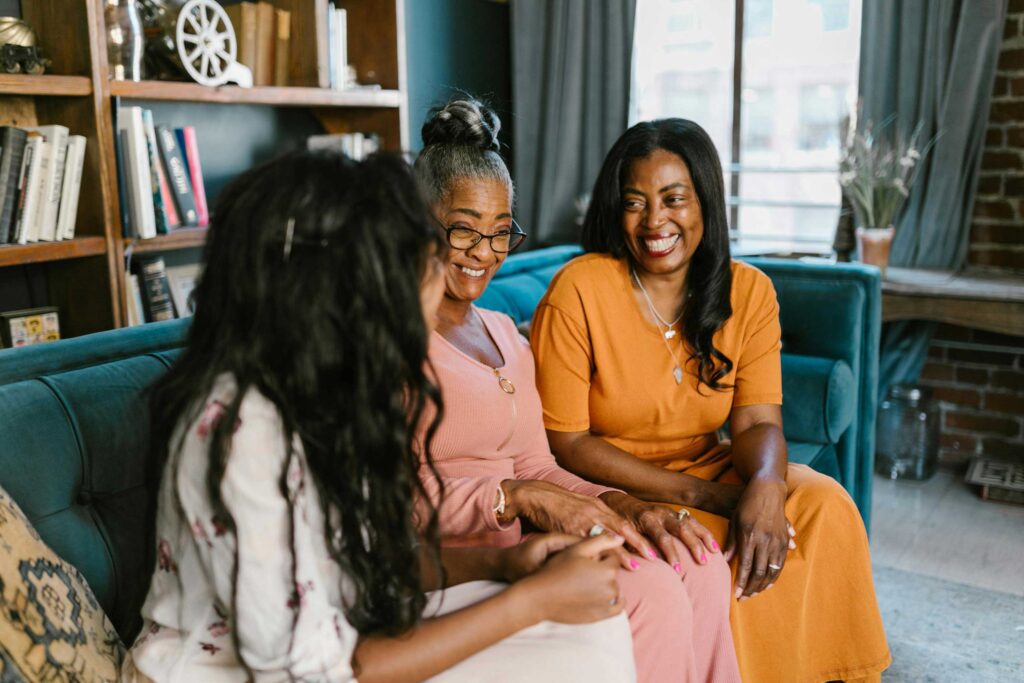Recovery from mental health conditions isn’t just about what happens at the doctor’s office. Having people who support you, meaningful activities, and a purpose in your community all play a role. No one recovers alone—connection is key.
In this article:
Key points
Being part of the community helps recovery
People with mental health conditions should have chances to work, go to school, make friends, and enjoy activities like everyone else. Being included in community life helps people heal.
Support from others makes a big difference
Peer support groups and programs give people a chance to share their experiences, learn skills from others with similar experiences, and feel understood.
Recovery includes more than just therapy or medicine
It also means finding purpose, meaning, and connection in whatever way feels meaningful to you. This could include things like a job, volunteer opportunities, friendships, spirituality, hobbies and more.
Community inclusion
Community inclusion means that all people have the right to be respected as members of their communities. Those with mental health conditions, just like everyone else, should have the right to:
- Take part in recreational activities in neighborhood settings
- Work at jobs in the community that pay a competitive wage
- Explore and use their skills and abilities to the fullest
- Pursue educational opportunities with their peers
People with mental health conditions can face a lack of community inclusion because of stigma. This is made worse by common hindrances such as transportation/location, financial barriers, and access to services.
Peer support and other forms of community involvement can help people feel a sense of purpose and belonging. This can play a critical role in the recovery process.
Peer support
Peer support allows people with a mental health condition to connect with someone who understands them. Peer support specialists are trained to help individuals in recovery lead a meaningful life. Peers can educate, mentor, and motivate by sharing their own unique experiences living with mental health conditions.
Peer support can benefit those in recovery through:
- Improved quality of life
- Improved engagement and satisfaction with services and supports
- Improved whole health, including chronic conditions like diabetes
- Decreased hospitalizations and inpatient days
- Reduced overall cost of services
Contact your local MHA affiliate to get information about peer support groups, drop-in centers, or peer respites in your area.
Outpatient programs
Outpatient programs include intensive outpatient programs (IOPs) and partial hospitalization programs (PHPs). These programs can help you identify treatment goals and create structure in your life that promotes recovery. They may include group therapy, individual therapy, and case management support. Outpatient programs can be especially supportive for people who have received in-patient psychiatric care as they transition back to their community.
Find your local MHA affiliate and see what programs they offer.
Housing
A safe and stable home is essential for well-being. If you’re struggling with housing, consider different options based on your needs:
- Supportive housing offers services alongside a stable living space
- Shared or group housing provides community and affordability
- Rental assistance programs can help with costs
Look for local housing initiatives, community development agencies, or “housing first” programs that focus on providing stability first, so you can focus on recovery.
Employment
In the past, people with mental health conditions were often discouraged from working. Today, we understand that work is not only a possibility, but also can play a vital role in recovery. It feels good to accomplish something, and meaningful work—whether paid or volunteer—can boost confidence and provide structure. Some alternatives to traditional employment, which may feel overwhelming if you are just starting your recovery journey, include:
- Job training or placement programs for people in recovery
- Supported employment services that match jobs to your strengths
- Volunteering or internships as a way to gain experience at your own pace
Check with local workforce programs, vocational rehab services, or community organizations (like MHA affiliates) to explore job opportunities that fit your needs. Small steps toward stability can be empowering and rewarding.
Education
Education can help your recovery by broadening your intellectual, social, and emotional horizons. As someone living with a mental health condition, you are able to receive academic accommodations so your learning needs can be met. Some educational options include:
- Community and career colleges
- Supported education
- Special education
- Alternative secondary schools
- GED and high school equivalency programs
Some people may not want to pursue education in a formal way. But learning comes in many forms. You can use your local library to find books that will support your recovery, attend workshops/events that interest you, or find self-paced learning options online to develop new skills.
Physical fitness
What is good for your body is good for your mind. Moving your body in whatever way feels accessible to you can help you release challenging emotions like rage and frustration. It can also increase feelings of positivity and well-being.
You can schedule a time to exercise each day either on your own or with a friend. This could include walking, swimming, biking, playing a sport, or even cleaning! Community health clinics or gyms also offer a variety of programs like yoga, dance classes, personal training, and more.
Faith and spirituality
Many people in recovery find belonging through religious and spiritual communities. Spiritual involvement can help you connect with others. It can also help enhance your mood, reduce anxiety and depression, and be a reminder of goodness in the world. If you are interested, you can try participating in a religious service or other activity organized by a place of worship. You can also seek out spiritual direction from a chaplain, minister, monk, or other clergy member for one-on-one support.
Friendships
When you are going through mental health challenges, it can be hard to stay in touch with friends. But finding ways to connect with people can support your recovery. Texting or even writing letters can be a low-pressure way to reconnect before rejoining in-person activities. You can also meet new friends by searching for interest-based groups through apps like Meetup, Facebook or online community support tools like MHA’s Inspire Community.
Family and intimate relationships
Family relationships can be a valuable part of your recovery. But they can also feel challenging to navigate and may not be as supportive as you would like. It’s important to remember that when it comes to family –relationships can take time to heal. You may want to think of one or two family members who are accepting and supportive to spend time with to start. Family therapy can also help family members communicate and solve problems more effectively. If you want to have a difficult conversation with a family member, you can try preparing beforehand. This can help you feel more grounded because you’ll have an idea of what you’d like to say. You can also practice setting boundaries with family members to make sure your needs are respected as you recover.
Living with a mental health condition does not need to be a barrier to forming intimate relationships. As long as you are taking care of yourself and ready to nurture your bond with your partner, intimate relationships can be fulfilling and support recovery. Do your best to talk with your partner about your mental health condition and how it affects you. You can even create a daily check-in routine with your partner where you ask each other about mood, energy levels, what kind of support each of you may need, etc. This can foster consistent and open communication that helps maintain a healthy relationship.
Take a mental health test
 If you or a friend are struggling with your mental health, take an anonymous, free, and private mental health test. It only takes a few minutes, and after you are finished, you will be given information about the next steps you can take based on the results.
If you or a friend are struggling with your mental health, take an anonymous, free, and private mental health test. It only takes a few minutes, and after you are finished, you will be given information about the next steps you can take based on the results.


